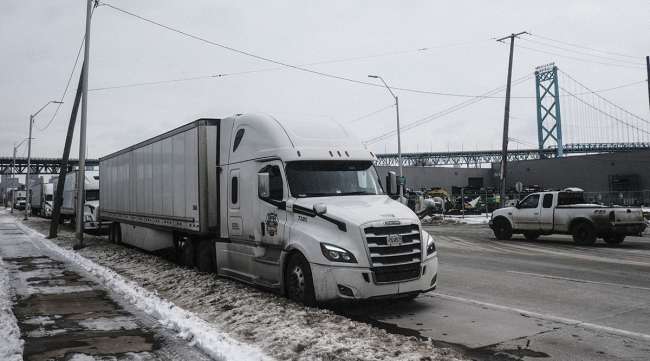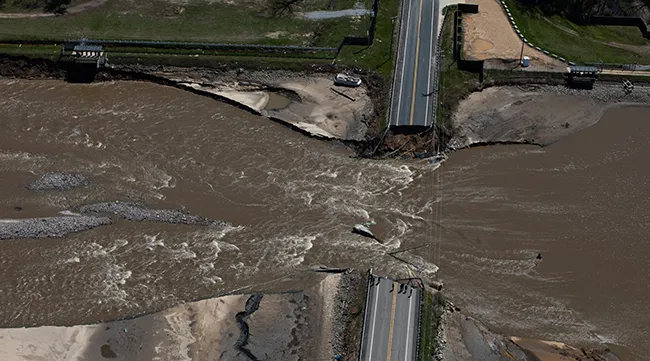The Detroit News
Michigan Roads See Funding Gap of Up to $3.9 Billion as Report Floats Tax Increase

[Stay on top of transportation news: Get TTNews in your inbox.]
Michigan has an annual funding gap of roughly $2.1 billion to $3.9 billion when it comes to money to maintain the state’s crumbling roads and bridges — even after record federal aid and state bonding is taken into account, according to a new study of the state’s infrastructure costs.
And the options for filling that gap are less than savory, with one option exceeding a tax increase proposal from Michigan Gov. Gretchen Whitmer that was soundly rejected four years ago.
The funding gap is based on new assessments that put Michigan’s transportation network costs higher than previously believed — between $9 billion and $16.7 billion annually to operate and maintain, with the upper end depending on the amount of deferred maintenance.
The study conducted by Lansing-based Public Sector Consultants was commissioned by the Michigan Infrastructure and Transportation Association, a trade group that represents road construction companies.
Closing the revenue gap would cost $285 to $535 annually for every adult in Michigan, the report said.
The policy analysts at PSC floated several possible solutions to close Michigan’s annual road-funding gap, one of which would go beyond Whitmer’s unpopular 45-cent-per-gallon gas tax increase proposal from 2019.

Host Seth Clevenger chats with Evan Shelley, co-founder and CEO of TruckParkingClub. Hear the program above and at RoadSigns.TTNews.com.
To eliminate the existing road funding deficit, Michigan’s motor fuel tax of 28.6 cents per gallon would need to be 39 cents to 74 cents per gallon higher, the report said.
Other options include a shift and increase of the motor fuel tax from per gallon to per dollar — which would increase tax revenue during periods of high gas prices — or a constitutional amendment to hike the state’s 6% sales tax to 8% or 9% and earmark the additional revenue for roads. In a May 2015 special election, Michigan voters resoundingly rejected a two-cent increase in the sales tax for roads at the ballot box.
A separate constitutional amendment could allow local communities to levy their own sales tax for local roads, or drivers could be taxed between 3 cents and 5 cents per mile traveled switching to a mileage-based mechanism, the report said.
Michigan’s gas tax increased by seven cents per gallon in 2017 to roughly 26 cents per gallon under a 2015 road funding plan. But the added funds still fell far short of what experts have long said is needed to get a majority of roads in good condition. The motor fuel tax rose from 27.2 cents per gallon to 28.6 cents on Jan. 1 through an inflationary increase built into the 2015 road-funding law.
In 2019, newly elected Whitmer proposed a 45-cent gas tax increase that was eventually abandoned in favor of a $3.5 billion bonding model that would be repaid over the next 25 years. The Michigan Department of Transportation has said the 25-year cost of the bonds will be $6 billion when interest is factored in.

A road collapsed due to flood water after dams failed in Midland, Mich., in May 2020. (Emily Elconin/Bloomberg News)
The proposed gas tax increase was widely unpopular and was eventually called an “extreme that won’t happen” by then-House Democratic Leader Christine Grieg of Farmington Hills.
Even with the continued disbursement of that $3.5 billion in bonds and roughly $7.3 billion from the federal Infrastructure Investment and Jobs Act, Michigan falls short about $3.9 billion, according to the report.
The longer that gap goes unaddressed the more maintenance will be deferred and the more money, in the long run, will need to be spent to bring infrastructure back up to par.
Researchers at PSC planned to highlight the report at a press conference March 7 with leaders from groups that have spent years lobbying lawmakers on transportation infrastructure issues: MITA, the Detroit Regional Chamber, the Michigan Chamber of Commerce, the County Road Association of Michigan and the Michigan Municipal League.
Want more news? Listen to today's daily briefing below or go here for more info:
Distributed by Tribune Content Agency, LLC




